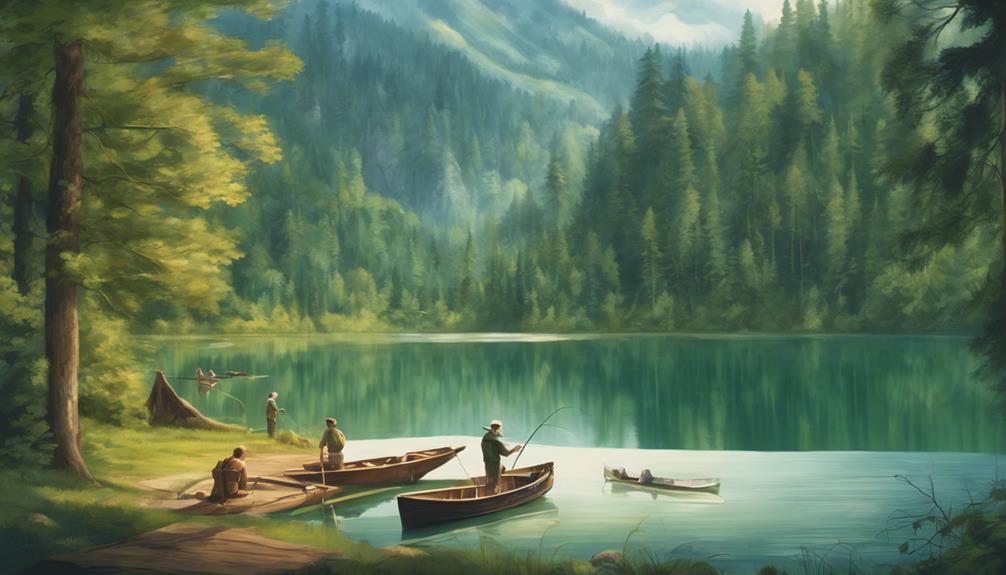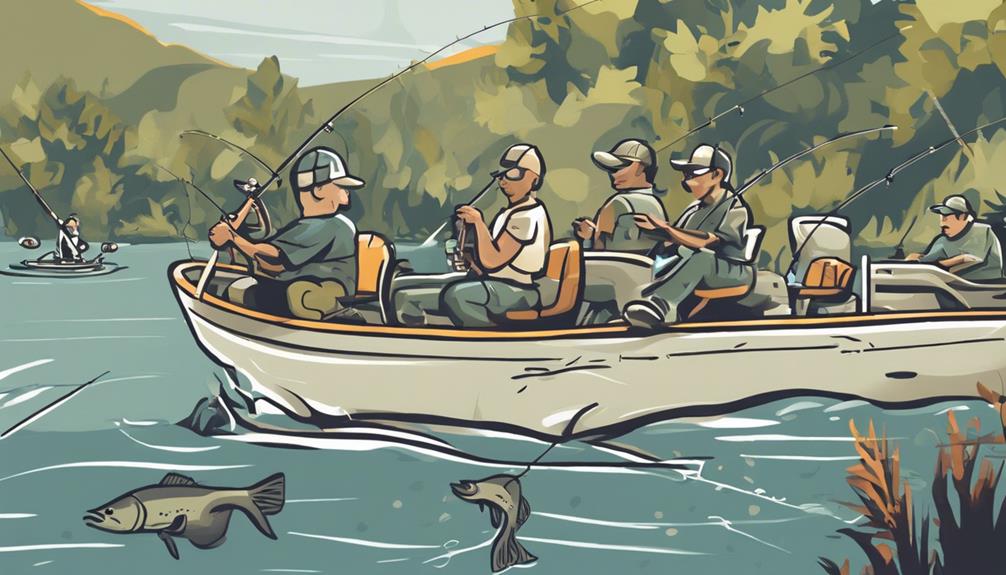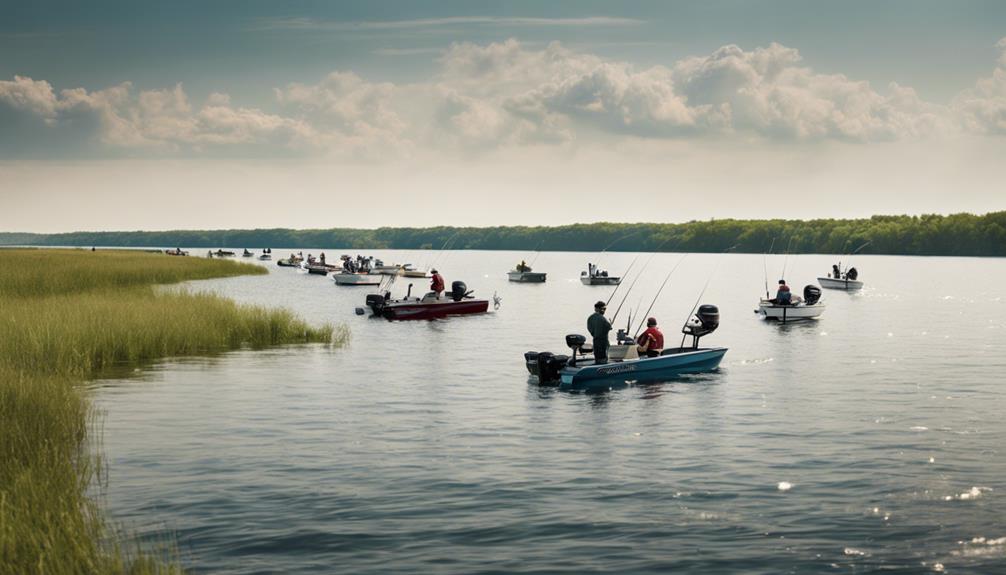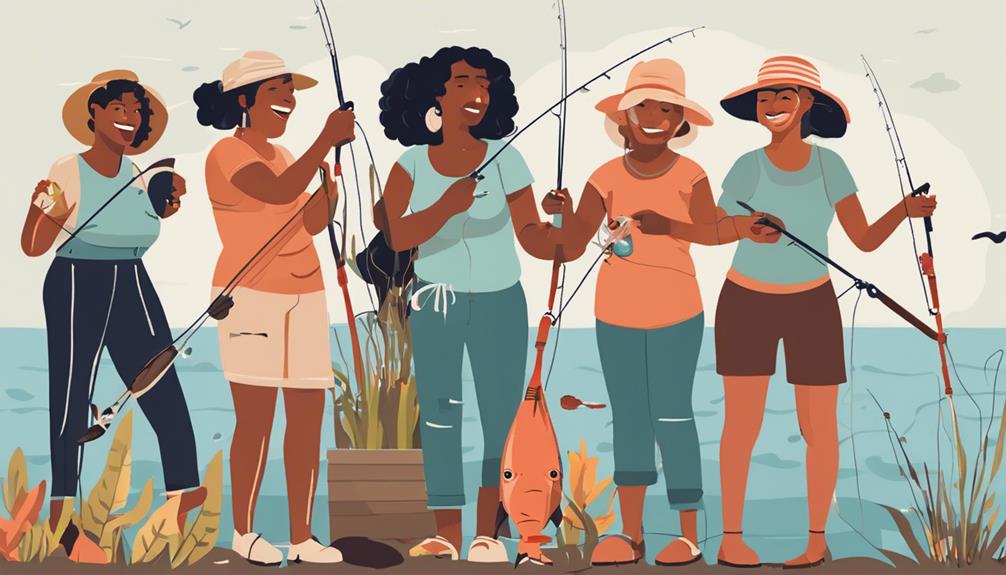National parks are perfect for fishing tournaments due to their rich biodiversity and conservation efforts. These locations offer serene landscapes and pristine waters, enhancing your angling experience. Remote spots provide sanctuary for diverse fish populations, promoting sustainability. By partaking in ethical angling practices, you contribute to habitat protection and species survival. Understanding ecological interactions is key to maintaining fish diversity. Engage in tournaments within national parks to support community involvement and economic growth. Explore the natural habitats of these parks to experience a blend of competition and harmony with nature. More insights await on why these parks are a top choice for fishing tournaments.
Biodiversity in National Parks
Within national parks, the biodiversity of flora and fauna is meticulously documented to understand and preserve the delicate ecosystems present. Maintaining ecological balance is crucial for wildlife protection. National parks serve as havens for a wide array of species, playing a significant role in preserving biodiversity. The intricate web of interactions among different organisms is essential for the sustainability of these ecosystems.
Wildlife protection within national parks is paramount to safeguarding vulnerable species and maintaining the overall health of the environment. By carefully monitoring and managing wildlife populations, park authorities can ensure that no species is overexploited or endangered. This proactive approach helps in maintaining the delicate ecological balance that's essential for the survival of various plants and animals.
The environmental impact of human activities on marine ecosystems is a growing concern worldwide. National parks provide a sanctuary for marine life, offering protection from destructive practices such as overfishing and pollution. By designating certain areas as marine reserves within national parks, authorities help safeguard critical habitats and ensure the long-term health of these ecosystems. Preserving marine biodiversity is vital not only for the species living within these ecosystems but also for the overall health of our planet.
Scenic Fishing Locations
Amidst the vast expanse of national parks lie scenic fishing locations that offer anglers a unique opportunity to engage with diverse aquatic ecosystems. These tranquil landscapes and peaceful waters not only provide an escape from the hustle and bustle of daily life but also create an ideal setting for fishing tournaments. Here are three reasons why these picturesque backdrops in remote locations make national parks perfect for anglers:
- Tranquil Landscapes: National parks offer serene settings that are often untouched by urban development. The calming presence of nature allows anglers to focus on their fishing experience without distractions. The gentle rustling of leaves and the soft gurgle of flowing water create a peaceful ambiance that enhances the overall fishing experience.
- Peaceful Waters: The waters in national parks are typically pristine and unpolluted, providing a healthy habitat for various fish species. The clarity of these waters allows anglers to observe fish behavior and patterns, increasing the chances of a successful catch. Additionally, the undisturbed nature of these waters contributes to the overall tranquility of the fishing environment.
- Picturesque Backdrops, Remote Locations: National parks often boast stunning landscapes that serve as the backdrop for fishing activities. Anglers can enjoy panoramic views of mountains, forests, or lakes while casting their lines. Being in remote locations also means less human disturbance, allowing anglers to immerse themselves fully in the natural beauty surrounding them.
Access to Pristine Waters
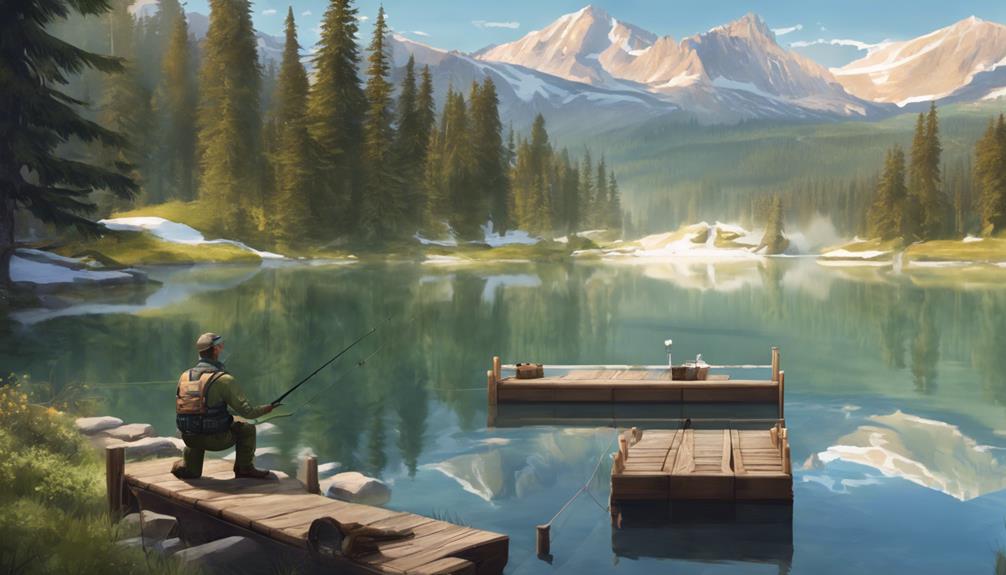
Access to pristine waters within national parks is essential for anglers seeking an unspoiled environment conducive to observing fish behavior and patterns. National parks offer a unique opportunity for anglers to fish in a pristine environment that's often untouched by human activity. These remote locations provide a sanctuary for fish populations, allowing them to thrive in their natural habitat without the disturbances commonly found in more accessible fishing spots.
The pristine environment of national park waters is crucial for maintaining healthy fish populations and preserving the biodiversity of aquatic ecosystems. Remote locations within national parks are often less impacted by pollution, overfishing, and habitat destruction, creating ideal conditions for fish to grow and reproduce. Anglers benefit from this unspoiled environment as they can observe and interact with fish in their natural state, gaining valuable insights into their behavior and feeding patterns.
In addition to offering a more authentic fishing experience, access to pristine waters in national parks promotes conservation and sustainability. By protecting these remote locations and the fish populations that inhabit them, national parks play a vital role in ensuring the long-term health of aquatic ecosystems. Anglers who fish in national park waters contribute to conservation efforts by respecting the delicate balance of these environments and practicing responsible fishing methods.
Conservation and Sustainability
Preserving the delicate balance of aquatic ecosystems in national parks is paramount for ensuring the long-term conservation and sustainability of fish populations. To achieve this goal, several key strategies and practices are essential to maintain healthy fish populations while allowing for recreational fishing activities:
- Environmental stewardship and ethical angling: National parks serve as crucial habitats for various fish species. Engaging in ethical angling practices, such as catch-and-release fishing, can help minimize the impact on fish populations. Additionally, promoting environmental stewardship among anglers is vital to ensure that these pristine environments remain intact for future generations to enjoy.
- Resource management: Effective resource management is essential to prevent overfishing and depletion of fish populations. Implementing catch limits, size restrictions, and seasonal closures can help regulate fishing activities and protect vulnerable fish species. By carefully monitoring fish populations and implementing sustainable fishing practices, national parks can maintain a healthy balance within their aquatic ecosystems.
- Habitat protection: Preserving the natural habitats of fish species is critical for their survival. National parks play a crucial role in habitat protection by conserving water quality, maintaining riparian zones, and restoring degraded habitats. By safeguarding the diverse ecosystems within national parks, authorities can ensure the long-term sustainability of fish populations and promote biodiversity conservation.
Diverse Fish Species
Ensuring the biodiversity of fish species within national parks requires a comprehensive understanding of their habitats and ecological interactions. Angler education plays a crucial role in maintaining diverse fish populations. By educating anglers about the importance of sustainable practices, such as catch and release, respecting fishing quotas, and using environmentally friendly gear, the delicate balance of fish species can be preserved and even enhanced.
Sustainable practices are essential to safeguarding the variety of fish species found in national parks. Overfishing and habitat destruction can have detrimental effects on fish populations. By implementing regulations that promote sustainable fishing practices, national parks can protect the diverse array of fish species that inhabit their waters. These practices not only benefit the fish populations but also ensure that future generations of anglers can continue to enjoy the beauty and richness of these ecosystems.
Understanding the ecological interactions between different fish species is key to maintaining a healthy and diverse aquatic environment. By studying the behaviors, feeding habits, and breeding patterns of various fish species, park authorities can better manage and conserve these populations. Angler education programs that focus on the importance of biodiversity and sustainable fishing practices help foster a sense of stewardship among anglers, ensuring that national parks remain havens for diverse fish species for years to come.
Recreational Opportunities
To fully appreciate the biodiversity of fish species in national parks, understanding the recreational opportunities available for anglers is crucial. National parks offer a plethora of recreational opportunities for fishing enthusiasts, making them ideal locations for fishing tournaments. Here are three key reasons why national parks provide exceptional recreational opportunities for anglers:
Recreational Opportunities in National Parks:
- Outdoor Adventures: National parks are known for their stunning landscapes, pristine waters, and diverse ecosystems. These parks offer anglers the chance to engage in fishing activities amidst breathtaking natural surroundings. Whether it's fly fishing in a tranquil river or casting a line in a crystal-clear lake, national parks provide the perfect setting for outdoor adventures that enhance the fishing experience.
- Family Bonding: Fishing in national parks isn't only a solitary activity but also an excellent opportunity for families to bond. Many national parks have designated fishing areas that cater to families, providing a safe and enjoyable environment for anglers of all ages. Parents can pass on their fishing skills to their children, creating lasting memories and strengthening family ties through shared outdoor experiences.
- Educational Opportunities: National parks offer more than just a place to fish; they also serve as educational hubs where anglers can learn about different fish species, ecosystems, and conservation efforts. Engaging in fishing activities in national parks provides a hands-on learning experience, allowing anglers to gain a deeper understanding of the natural world and the importance of preserving it for future generations.
Community Engagement
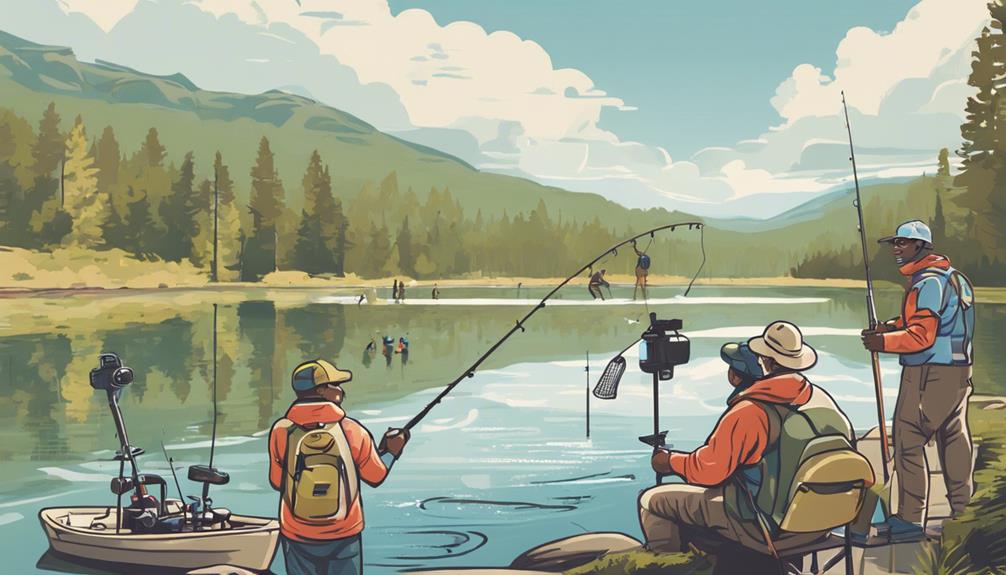
Engage with local communities to enhance the conservation efforts and sustainable management of fishing resources within national parks. Local involvement is crucial in fostering a sense of ownership and responsibility towards the preservation of these natural habitats. By actively engaging with the community, park authorities can leverage local knowledge and traditions to develop effective conservation strategies tailored to the specific needs of the area.
Furthermore, involving the community in fishing tournaments held within national parks can have a significant economic impact. These events attract participants and spectators, leading to increased tourism revenue for the local businesses. Additionally, such tournaments serve as social gatherings that bring people together, fostering a sense of camaraderie among fishing enthusiasts and locals alike.
Community engagement also plays a vital role in educating the public about the importance of conservation efforts. By organizing workshops, seminars, and outreach programs, national parks can raise awareness about sustainable fishing practices and the significance of preserving the delicate balance of the ecosystem. Through these initiatives, local communities become active participants in safeguarding the natural beauty and biodiversity of the national parks for future generations to enjoy.
Preserving Natural Habitats
Preservation of natural habitats plays a critical role in maintaining ecosystem health and biodiversity within national parks. When organizing fishing tournaments in these areas, it's essential to prioritize wildlife protection and minimize the environmental impact to ensure the sustainability of the ecosystem.
Here are three key considerations for preserving natural habitats in national parks:
- Habitat Restoration: National parks often face challenges such as habitat degradation due to human activities or natural disasters. Engaging in habitat restoration projects can help mitigate these issues by restoring critical habitats for various species. By restoring wetlands, forests, or grasslands, the natural balance can be reinstated, supporting the diverse wildlife populations that rely on these habitats.
- Invasive Species Management: Invasive species pose a significant threat to native flora and fauna within national parks. These species can outcompete native species, disrupt food chains, and alter the ecosystem dynamics. Implementing invasive species management strategies, such as removal programs or biological control methods, is crucial to protect the native biodiversity and maintain the ecological balance within the park.
- Sustainable Practices: Adopting sustainable practices during fishing tournaments, such as catch-and-release policies, proper waste disposal, and minimizing noise pollution, can help reduce the environmental impact on natural habitats. These practices promote the conservation of wildlife populations and ensure that the ecosystem remains resilient in the face of human activities. By prioritizing sustainable approaches, national parks can continue to thrive as havens for biodiversity and ecological preservation.
Frequently Asked Questions
Are Fishing Tournaments Allowed in All National Parks?
Fishing tournaments aren't allowed in all national parks due to environmental impact concerns and regulations. Public access is typically restricted to protect sensitive ecosystems and wildlife habitats.
Conservation efforts play a crucial role in maintaining the delicate balance of these protected areas. Therefore, before organizing a fishing tournament in a national park, it's essential to check with park authorities to ensure compliance with rules and regulations in place to safeguard the park's natural resources.
How Are Fishing Tournaments Regulated in National Parks?
Fishing tournaments in national parks are regulated through specific tournament regulations that dictate rules for participants such as catch limits and gear restrictions. Enforcement is typically carried out by park rangers to ensure compliance.
These regulations aim to balance the enjoyment of fishing tournaments with conservation efforts to minimize the impact on the park's ecosystem. Consistent monitoring and enforcement are crucial to uphold these regulations and maintain the ecological integrity of national parks.
Do National Parks Provide Equipment for Fishing Tournaments?
National Parks typically don't provide equipment for fishing tournaments. Anglers usually bring their own gear to comply with regulations and restrictions set by park authorities.
However, some parks may offer equipment rental services for visitors who don't have their own gear. These services can vary depending on the park, so it's essential to check with park officials beforehand to ensure availability and compliance with fishing tournament rules.
Are There Age Restrictions for Participating in Fishing Tournaments?
When it comes to fishing tournaments, age restrictions are common to ensure safety and fair competition. Parental consent is often required for youth participation in these events. This practice helps to uphold regulations and protect young participants.
What Safety Measures Are in Place During Fishing Tournaments in National Parks?
Safety precautions during fishing tournaments in national parks include:
- Mandatory life jacket usage
- First aid kits on-site
- Emergency response plans in case of accidents
These measures aim to ensure the well-being of participants and address any potential risks that may arise during the event.
Conclusion
In conclusion, national parks serve as ideal locations for fishing tournaments due to their rich biodiversity, scenic fishing spots, access to pristine waters, commitment to conservation and sustainability, diverse fish species, recreational opportunities, community engagement, and preservation of natural habitats.
These protected areas provide a unique environment for anglers to enjoy the sport of fishing while also promoting the importance of environmental stewardship and the preservation of natural resources.
